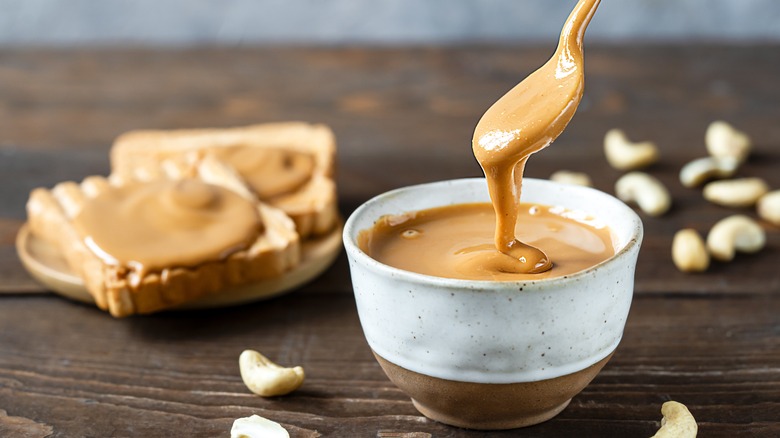What It Means If Eating Peanut Butter Makes You Feel Gassy
Biting into a moist peanut butter cookie, tasting a drizzle of Thai peanut sauce, or snacking on a scoop of peanut butter straight from the jar brings us nothing but pure joy. For some people, however, the creamy nut butter alternatively brings about an upset stomach. Delicious as it may be, if peanut butter prompts gas and gurgling in your gut, it may indicate a sensitivity to some of the sandwich spread's natural compounds — or that you're perhaps eating more peanut butter than your body can handle.
Peanut butter is already tricky enough to digest on its own. Healthline notes that chunky peanut butter in particular can take longer for the body to break down due to its high fat content. Experts at Orlando Health explain that, although the popular toast topping contains healthy fats (as opposed to the saturated fat you'll find in fried foods), overconsumption of peanut butter can leave you feeling gassy and bloated when left to ferment in the gastrointestinal tract (via Nutrients).
Peanut butter's high fiber content or a food sensitivity may be causing your gas
Peanut butter is also rich in fiber. In many ways this can make pooping faster and easier for people with constipation, but fiber can also leave us passing gas more than we might care to. Much like the fat content in peanut butter, fiber cannot be processed by the body. Instead, the bacteria in our microbiome chow down on the compound, releasing gas in the process, explains MedicineNet.
But fiber isn't the only compound in peanut butter that may stir up tummy trouble. "You may experience a stomach ache if you have a food sensitivity to salicylates and amines," registered dietitian nutritionist Gillean Barkyoumb tells Eat This, Not That! Salicylates are natural chemicals found in peanut butter that, when consumed in excess (or even just minor amounts on occasion), can cause gas, diarrhea, abdominal pain, and more in people with salicylate sensitivity (via Healthline). The chemical comes in both natural and synthetic forms. Similarly, amines are natural chemicals whose content increases with the aging and fermentation of foods (via Naturopath Life Wellness Centre). Peanuts contain high amounts of amines, and individuals with amine sensitivity may be more susceptible to gastrointestinal discomfort.
How to reduce flatulence from eating peanut butter
Depending on what's causing your peanut-butter-related tooting, different symptom-relief methods may be suggested. People with salicylate or amine sensitivities may be better off avoiding peanut butter and other foods with high amounts of these compounds; although some people may be able to tolerate small amounts in moderation. Speak with your doctor if you suspect you may be dealing with a food sensitivity or intolerance.
If gas isn't related to a food sensitivity, you may want to play around with different fiber-rich foods to see if some are more gas inducing than others. MedicineNet explains that some types of fiber, such as those found in fruits and vegetables, are more closely linked with increased farting. If peanut butter is one of those foods for you, try consuming lesser amounts or going without it for a little while. When re-introducing peanut butter into your diet, be sure to drink plenty of water to support optimal digestive health. Finally, Drugs.com reports that smooth peanut butter is less likely to make you gassy. Therefore, consider opting for creamier peanut butters over chunky varieties, reducing your overall intake, or cutting out peanut butter entirely for the time being.



